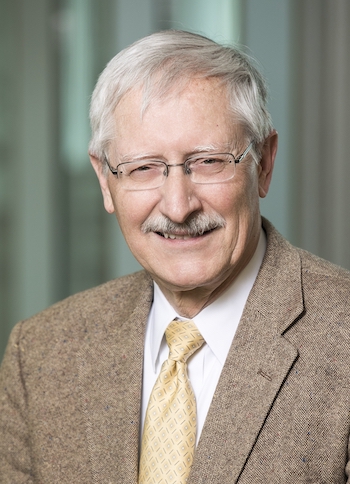In This Story

For Russian President Vladimir Putin, the Cold War with the United States never ended, said Richard Kauzlarich, a distinguished visiting professor at George Mason University.
And that is what makes the current crisis in Ukraine, against which Russia has amassed 100,000 troops, so dangerous.
“This is something Putin created himself, and he’s not approaching it with real policy objectives you can negotiate with or deal with,” said Kauzlarich, who from 1991 to 1993 was deputy assistant secretary of state in the Bureau of European Affairs, with responsibility for relations with the former Soviet Union and economic ties with the European Union.
Putin wants NATO to declare it will not allow Ukraine to become a member. But Kauzlarich and others point out that such a declaration would be in direct opposition to NATO’s traditional open-door policy.
“So, could we say, ‘Well, we understand Ukraine isn’t really ready to join NATO and therefore we’re going to shut that door?’" Kauzlarich said. “I don’t think that solves anything. [Putin’s] game is bigger than that.”
What is Putin’s end game?
“He wants to reverse what he sees as U.S. and NATO victories, if you will, during that period immediately after the collapse of the Soviet Union,” Kauzlarich said. “Another element is whether he wants to reconstitute the Soviet Union. He certainly wants to reconstitute Russian presence in a much stronger way in those former Soviet republics. So this may be the opportunity to do just that.”
Why now?
“I think Putin believes he has an advantage over Biden,” Kauzlarich said. “He sees the U.S. weakened by the internal political differences that have affected our political system. People are distracted by COVID. Maybe he thinks the U.S. would be too concerned about China to care wat he might have in mind for Ukraine. I don’t know whether he believes Ukraine is going to join NATO or not. I just think he’s a tactician. He tries to take advantage of any opportunity, and he saw one here.”
Do you foresee U.S. troops on the ground in Ukraine?
“If there is an attack on Ukraine, NATO would respond,” Kauzlarich said. “It may not be with troops in Ukraine, but there are any number of ways the U.S. and its allies can get Russia’s attention. My guess is there would be economic sanctions. There are measures we can take against the leaders of Russia that won’t affect the people of Russia. We’re doing assistance to the Ukraine military that could expand, as well as strengthening weaker allies of the alliance like the Baltic states, in particular.”
Is the crisis an existential threat to NATO?
“I really don’t think so,” Kauzlarich said. “It’s had the opposite affect from what Putin wanted. For goodness sake, you have people in Finland and Sweden talking about joining NATO. That’s the last thing the Russians would want is to have neutral countries on their border join NATO.”
So how will this play out?
"At a minimum, we’re looking at a continuing crisis with Russia over Ukraine,” Kauzlarich said. “[Putin] may want to move out into Ukraine further, solidify control on Donbas and that’s it.”
Kauzlarich said he’s not sure that would lead to a full-blown invasion. “It will be less direct, and we’ll have some collateral activities where Putin will try to show the U.S. and our allies that he can reach out and touch us as well. By that I mean cyber attacks on vulnerable U.S. infrastructure. He may try to do more joint military exercises with China,” such as through cyber attacks on U.S. infrastructure.
Richard Kauzlarich, who served as U.S. ambassador to Bosnia and Herzegovina from 1997-99, and to Azerbaijan from 1994-97, can be reached at rkauzlar@gmu.edu.
For more information, contact Damian Cristodero at 703-993-9119 or dcristod@gmu.edu.
About George Mason
George Mason University is Virginia’s largest public research university. Located near Washington, D.C., Mason enrolls more than 39,000 students from 130 countries and all 50 states. Mason has grown rapidly over the past half-century and is recognized for its innovation and entrepreneurship, remarkable diversity and commitment to accessibility.
